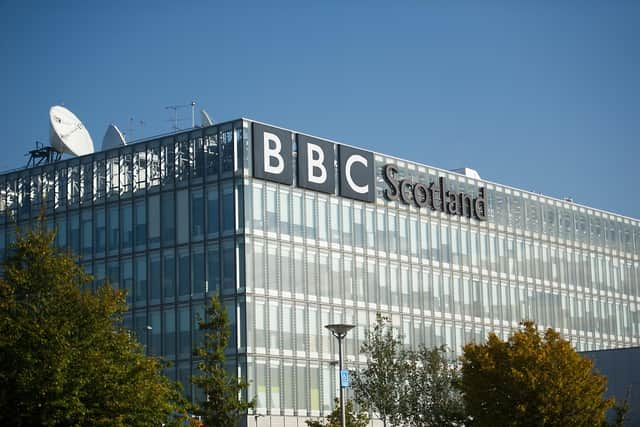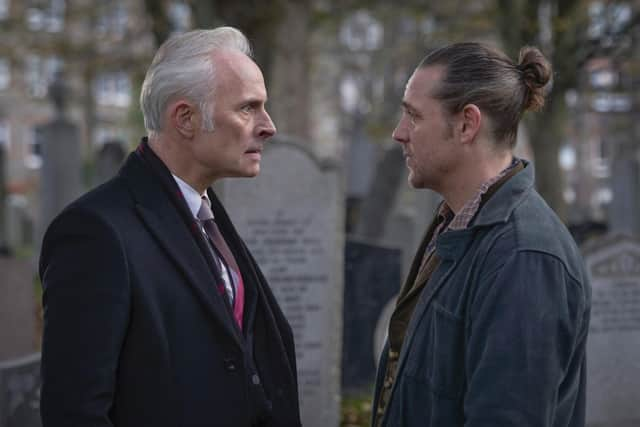BBC Scotland’s boss on the end of The Nine, why a ‘Scottish Six’ would not work and the new channel’s first five years
It was the biggest shake-up in broadcasting in Scotland for more than 20 years.
Five years may have passed since the arrival of a new BBC Scotland channel, but it is still generating as much debate as it did at its much-anticipated launch at its Pacific Quay headquarters in Glasgow.
Advertisement
Hide AdAdvertisement
Hide AdThe run-up to the channel’s fifth anniversary this weekend has been dominated by controversy over the dropping of its flagship news programme, The Nine, amid claims from the Scottish Government the BBC is imposing “massive cuts” in Scotland.


BBC Scotland director Steve Carson is adamant there will be no scaling back of its news and current affairs coverage – but also that its output needs to reflect fast-changing audience habits.
The hour-long editions of The Nine are to be replaced by a new half-hour show that will start on the BBC Scotland channel as soon as Reporting Scotland finishes on BBC One, while a podcast-style topical affairs show will appear across the Sounds app, the BBC Scotland channel, BBC One and the iPlayer.
However, the BBC Scotland shake-up – which will also see Reporting Scotland extended on “big news days” and the weekly Debate Night show expanded from 24 to 30 episodes – will have to be approved by regulator Ofcom, as the amount of “news” coverage on the channel will be cut from 250 to 150 hours per annum.
Around £19 million worth of new investment per year was pledged for the new channel, which has had an overall budget of around £32m a year.


In an exclusive interview at Pacific Quay, Carson insisted there would be no cuts to resources or investment at BBC Scotland as a result of the proposed changes.
But he admitted BBC Scotland had to respond to the declining audiences for The Nine, which dropped from around 150,000 a week in its first three years to an average of 100,000 last year.
Advertisement
Hide AdAdvertisement
Hide AdHe said: “We’re very proud of The Nine. It had a significant investment in Scottish journalism, which allowed us to bring in a lot of new talent, who now appear throughout our schedules.
"The Nine has had significant audiences, but as we head into a busy news period we can read the signals from our audience. They still want TV news, but they want other things as well. We want to draw on our talent for the new current affairs show.


"A good example of how we can innovate with the talent and resources we’ve got is The Sunday Show, which goes out simultaneously on BBC One, Radio Scotland, the iPlayer and Sounds. Podcasts like Newscast also have a longer life on the iPlayer than straightforward news programmes.
“We want to keep a strong news presence on the channel and make sure the new half-hour programme is closely linked to Reporting Scotland.
“It will be a different programme, which will allow us to draw on a lot of the fantastic things that have come out of The Nine, get out around Scotland more, go deeper into stories that follow on from Reporting Scotland’s agenda, and also have a global focus, which The Nine has brought us.”
The Nine’s demise has reignited the debate about the case for the so-called “Scottish Six”, a news hour produced in Scotland to replace the UK network Six O’Clock News and Reporting Scotland.


Carson said: “We will actually be offering an hour of news in Scotland across our services that are linked but distinct, and will also be extending Reporting Scotland on big news days.
Advertisement
Hide AdAdvertisement
Hide Ad“But for us to create a brand new news hour on BBC One we’d essentially be moving resources into linear television at a time when audiences are looking for different forms of news coverage in different places.
“Under our plans, the channel would deliver around 150 hours of pure TV news each year. But we’ll also have the current affairs podcast running up to four times a week.
“The key fact is we’re not reducing our investment in news and current affairs. We just want to do things differently and respond to what audiences are looking for. We think it will be a series of positive changes – it's exciting to be talking about two brand new shows coming down the tracks.”
Carson insists the success of the channel’s output can be judged by the growth of BBC Scotland’s iPlayer audience.
He said: “The channel is a really useful shop window for all our content. It still reaches more people than any other digital channel in Scotland and is very often ahead of Channel 4, Channel 5 and BBC Two.


“But the really big story is the growth we’ve seen on the iPlayer. Last year we saw an average of 2.4m streams a week for our content, which was up around 45 per cent on the previous year. Across the five years, that figure has grown by around 250 per cent.”
Carson points to the range and geographical spread of BBC Scotland’s programming since the channel’s launch and the popularity of returning shows like Guilt, Inside Central Station, Granite Harbour, Martin Compston’s Scottish Fling, Murder Trial, Real Kashmir FC, Scotland's Home of the Year and Island Crossings.
Advertisement
Hide AdAdvertisement
Hide AdHe said: “Putting a new channel together was a huge undertaking. We really had to think about what it was going to be.
“We wanted it to be about modern Scotland today and how it really is. We had an informal commissioning policy of ‘no castles’. That was a kind of shorthand for what people outside Scotland think of when they think of Scotland. That wasn’t what we were about.
"We really wanted to get right around Scotland. I think we’ve really seen that with programmes like Island Crossings, My Kind Of Town and Mirror Mirror.
“We felt that giving Scotland’s people opportunities to tell their stories would give the channel that real sense of identity. We wanted to have bold and ambitious storytelling in our documentaries, and we also didn’t want to take ourselves too seriously.
"We’ve really been able to try different things out and show a real range of different things. If you step back and think about the programmes we’re making now, I think there has been a creative sea change.
“I think we’ve become a modern broadcaster, with a strong creative track record and a very strong connection with our audiences.”
Comments
Want to join the conversation? Please or to comment on this article.
